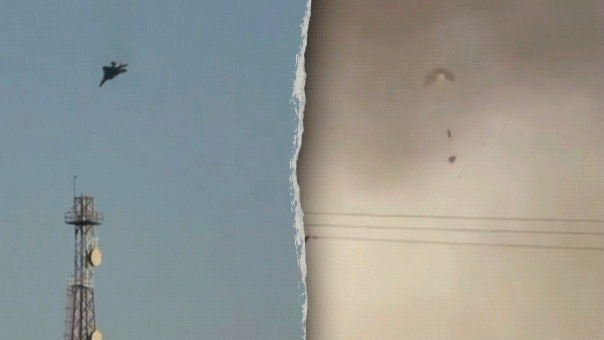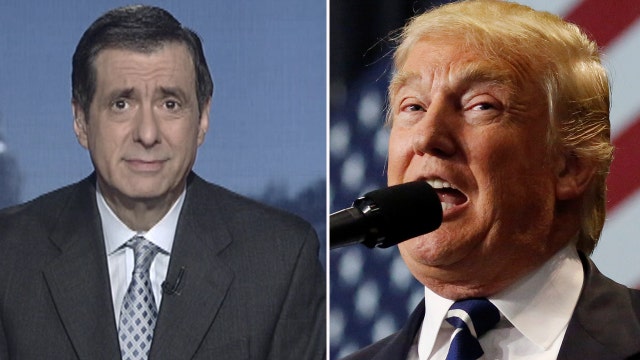Kurtz: Media vow to get tough on Trump
'MediaBuzz' host Howard Kurtz weighs in on press watchdogs baring their teeth at President-elect Trump
The media are vowing to get tough on the next president.
Suddenly, they’re like growling watchdogs baring their teeth.
Slate has a pop-up ad that links to a fundraising pitch: “President Trump has declared war on the press. Help us fight back.” It’s a liberal site, of course, but increasingly anti-Trump.
My position is the same with every administration: Journalists should aggressively cover those in power. It’s supposed to be an adversarial relationship.
All the critics who said the press wasn’t tough enough on Barack Obama can’t now turn around and insist that news outlets shouldn’t scrutinize Donald Trump.
By the same token, I don’t recall all this breast-beating at the end of 2008 about how the fourth estate would hold Obama accountable.
So it’s fascinating for me to watch journalists opine on covering this president-elect now and over the next four years.
Jim Rutenberg, the New York Times media columnist, praises CNN’s Jake Tapper for his aggressive questioning of Mike Pence. I’m all for that. But Rutenberg calls this “a shining example of stand-up journalism, because, unfortunately, such moments now seem so rare…If only such moments could stop being so special and start being normal.”
He writes that “television news is going to have to do its part should Mr. Trump and his administration try to make policy based on false assertions, the same way he used them on the campaign trail. (And, yes, television will have to be just as vigilant should Mr. Trump’s opponents use falsehoods to fight him, too.)”
That sentiment is worth more than a parenthetical sentence. With Harry Reid retiring, much of the mainstream media seems to have forgotten that he made up a blatant lie about Mitt Romney’s taxes and later said he was proud of it.
Rutenberg quotes CNN President Jeff Zucker as saying “the key for us” will be “to make sure that we hold the administration’s feet to the fire, hold them accountable — not presuppose that anything is wrong or bad, but not be intimidated and not be afraid to call things out.”
The subtext to many such critiques is that Trump is so different, and has such a loose relationship with the truth, and so openly disdains the media, that journalists have to quadruple their efforts against him. Which obviously raises questions of fairness and balance.
Refreshingly, former Politico Editor Susan Glasser writes that she doesn’t miss the old days: “Because, let’s face it: too much of Washington journalism in the celebrated good old days was an old boys’ club, and so was politics—they were smug, insular, often narrow-minded, and invariably convinced of their own rightness …
“Yes, we are now being accused—and accusing ourselves—of exactly the sort of smug, inside-the-Beltway myopia we thought we were getting rid of with the advent of all these new platforms. I’m as angry as everybody else at the catastrophic failure of those fancy election-forecasting models that had us expecting an 85 percent or even a ridiculous 98 percent—thanks Huffington Post!—chance of a Hillary Clinton victory. All that breathless cable coverage of Trump’s Twitter wars and the live shots of his plane landing on the tarmac didn’t help either. And Facebook and Snapchat and the other social media sites should rightfully be doing a lot of soul-searching about their role as the most efficient distribution network for conspiracy theories, hatred, and outright falsehoods ever invented.”
More important, Glasser has an “existential fear” because “the media scandal of 2016 isn’t so much about what reporters failed to tell the American public; it’s about what they did report on, and the fact that it didn’t seem to matter. Stories that would have killed any other politician—truly worrisome revelations about everything from the federal taxes Trump dodged to the charitable donations he lied about, the women he insulted and allegedly assaulted, and the mob ties that have long dogged him—did not stop Trump from thriving in this election year. Even fact-checking perhaps the most untruthful candidate of our lifetime didn’t work; the more news outlets did it, the less the facts resonated.”
That was the source of endless media frustration. Journalists would call out Trump for comments made without evidence, or that he maintained were sarcastic, or where the details were in dispute. And despite predictions of gloom and doom, these episodes wouldn’t hurt him with his supporters, and may even have helped him.
They heard Trump in a different way, as a politically incorrect guy willing to denounce the media, and gave him plenty of leeway rather than parsing his words.
The challenge now is to provide tough coverage of this president without crossing the line into hostility.











































